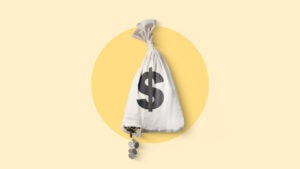The 5 most common types of bankruptcy

Key takeaways
- There are several kinds of bankruptcy as established by the United States Courts.
- The kind of bankruptcy filing available to you will depend on what kind of debtor you are — an individual, business or another kind of entity.
- Chapter 7 and Chapter 13 are the most commonly filed types of bankruptcy, likely because these are available to individual consumers.
- Bankruptcy is an effective way to discharge your debts, but it has a negative and lasting impact on your credit.
Bankruptcy can be a solution for individuals and businesses that can’t repay their debts. This legal process frees debtors from untenable debt while offering creditors a way to regain a portion of the money they’re owed.
There are several different options for declaring bankruptcy. If you’re considering taking this step, it’s important to understand how the different types of bankruptcy work so you can decide which option is best for you.
Bankruptcy: The basics
Bankruptcy is a legal proceeding that takes place in federal court. Typically, the debtor files a petition for bankruptcy. Depending on the type of bankruptcy case, the court may then evaluate the petitioner’s assets and determine what may be used to repay some of the outstanding debt. Alternatively, the court may create a plan for the petitioner to pay off some of the debt over time. Once the bankruptcy process is completed, the debtor is discharged from their financial obligations, meaning their eligible debts have been forgiven.
In bankruptcy cases, a trustee appointed by the U.S. Department of Justice typically manages the process. The trustee is responsible for ensuring the process follows legal guidelines and that the required funds are distributed to the creditors.
Considering the pros and cons of bankruptcy
Filing for bankruptcy can give debtors a fresh start, but it also comes with significant downsides that individuals and businesses should carefully consider before proceeding.
One major disadvantage is bankruptcy’s long-term impact on credit. Depending on the type of bankruptcy you file, it remains on your credit report for up to 10 years, severely affecting your ability to secure loans, mortgages or credit cards. The lowered credit score may result in higher interest rates on future borrowing.
Another downside is the potential loss of property. In Chapter 7 bankruptcy, non-exempt assets — which include homes, cars or other valuable possessions — may be sold to pay off creditors. While some assets are protected, this process can still result in significant losses.
Additionally, not all debts are dischargeable in bankruptcy. Student loans, alimony, child support and taxes generally cannot be eliminated, meaning individuals may still be responsible for substantial financial obligations after the process.
The most common types of bankruptcy in the US
Several different types of bankruptcy are available in the U.S., but your eligibility for each depends on your situation. Each type is named after the “chapter” of the U.S. Bankruptcy Code in which the option is outlined. We’ll cover the five most commonly filed types of bankruptcy in the U.S.
Chapter 7
Miami attorney Mark Hirsch, who has assisted clients with “challenging legal choices” such as bankruptcy for more than 30 years, explains Chapter 7 simply.
“Chapter 7 is designed for individuals or companies looking to liquidate assets to settle debts, typically utilized when there is minimal or no income,” he says.
In a Chapter 7 bankruptcy, the trustee sells certain assets to pay off a portion of the debt. State law dictates which assets can be exempt, but typically “essentials” such as clothing, your primary residence and your retirement account are safe from liquidation.
Chapter 7 bankruptcy cases are relatively quick, taking up to six months. Unfortunately, this type of bankruptcy filing will remain on your credit report for 10 years from the filing date. However, you may see your credit score bounce back sooner, according to Paul Koenigsberg, an attorney with decades of experience serving New York City and managing partner of Koeingsberg & Associates.
“Some filers see their credit scores improve within one to two years after the discharge due to the removal of past-due accounts,” Koeingsberg says.
To qualify for Chapter 7, most debtors must pass a means test proving that their income is less than their state’s median income.
“There are exceptions, such as if the majority of your debt is business-related, which can allow you to bypass this requirement,” Koeingsberg says
- Who it’s best for: Individuals who can pass the means test, as well as businesses.
- What happens to the debt: The debt is discharged.
- Primary advantage: The bankruptcy process is relatively quick, typically lasting four to six months.
- Primary disadvantage: Causes the loss of non-exempt assets, and some debt might not be discharged.
Chapter 9
Chapter 9 bankruptcy was designed specifically for municipalities, such as cities, towns and school districts. It allows them to reorganize their debts while continuing to operate.
Unlike Chapter 7, Chapter 9 does not involve the liquidation of assets. Instead, Chapter 9 bankruptcy provides protection from creditors while a municipality develops a plan to restructure and pay off its debts by taking out loans, offering municipal bonds and refinancing the debt with a lower interest rate.
- Who it’s best for: Municipalities in financial distress.
- What happens to the debt: The debt is reorganized.
- Primary advantage: Imposes an automatic stay, halting collections while the municipality reorganizes its debt.
- Primary disadvantage: Costly and can be hard to get approved.
Chapter 11
Chapter 11 bankruptcy is typically used by businesses to restructure their debts while continuing operations, though individuals can file too. Chapter 11 also allows the filer to retain its assets.`
Corporations filing Chapter 11 bankruptcy don’t risk putting shareholders’ assets at risk because the business is considered a separate entity from shareowners. On the other hand, in the case of a sole proprietorship, the court considers the owner and debtor the same person. That means both personal and business assets are considered with this type of bankruptcy filing.
Chapter 11 is relatively complicated and expensive. This makes it an option open mainly to businesses and wealthy individuals.
- Who it’s best for: Corporations or business partnerships.
- What happens to the debt: The debt is reorganized.
- Primary advantage: Businesses can remain operational with an automatic stay in effect during bankruptcy.
- Primary disadvantage: It’s costly and can be time-consuming.
Chapter 12
Chapter 12 is a debt reorganization filing open to family farmers and fishermen with regular income. This type of bankruptcy filing works similarly to Chapter 13. However, this option is more suited to agricultural workers with larger debts who don’t meet the financial criteria for a Chapter 13 filing.
Chapter 12 bankruptcy is also more straightforward than the Chapter 11 process. Repayment usually stretches out over three years; however, a court can also extend the repayment period for up to five years.
After the debtor completes the repayment plan, their debt is discharged. Certain types of debts, including child support or alimony, aren’t dischargeable with Chapter 12 bankruptcy.
- Who it’s best for: Family farmers or family fishermen with regular annual income.
- What happens to the debt: The debts are repaid with a repayment plan.
- Primary advantage: Can repay the debt over three to five years.
- Primary disadvantage: It might be more favorable to some creditors than Chapter 7, and the process is simpler than Chapter 11 for some businesses.
Chapter 13
As with Chapter 11 filings, Chapter 13 can be used by individuals who need to restructure their debt loads.
“Chapter 13 is intended for those with a consistent income seeking to restructure their debts and establish a feasible repayment plan, usually spanning three to five years,” Hirsch says. With this type of bankruptcy, debtors will pay some creditors back in full with interest and repay others for only a percentage of the debt.
This type of bankruptcy requires debtors to have regular income, and there are debt thresholds that restrict eligibility. However, there are advantages to this type of bankruptcy filing.
“One lesser-known fact about Chapter 13 bankruptcy is that debtors can propose repayment plans that are customized to their financial situation, potentially reducing monthly payments and making them more manageable,” Koenigsberg says. “Chapter 13 can also stop foreclosure proceedings and allow homeowners to catch up on missed mortgage payments as part of their repayment plan, something that is not available in Chapter 7.”
- Who it’s best for: Individuals with regular income.
- What happens to the debt: The debts are repaid with a repayment plan.
- Primary advantage: Can keep home from going into foreclosure.
- Primary disadvantage: Repayment plans can take up to five years.
Alternatives to bankruptcy
Due to the impact a filing can have on your credit report and score, bankruptcy should be used as a last resort. Here are some bankruptcy alternatives to consider.
Reach out to a credit counselor
Many types of bankruptcy require petitioners to attend credit counseling sessions. A credit counselor will discuss your financial options and help create a tailored plan. You can find a qualified nonprofit agency through the National Foundation for Credit Counseling.
Even without bankruptcy, credit counselors can offer a debt management plan, which is similar to Chapter 13 but may have less of an impact on your credit score. These professionals provide ongoing support, helping you negotiate with creditors or adjust payments.
Tighten your budget
Review your finances and create a strict budget to identify areas where you can save. This approach helps prioritize payments and may free up funds to help you avoid bankruptcy. If there’s little flexibility in your current budget, consider selling unneeded items or finding temporary income sources.
Negotiate with your creditors
Contact creditors to negotiate better terms or ask for debt settlement options. Some creditors may agree to accept less than the full amount if they know bankruptcy is on the table. While it’s not always successful, negotiating can help delay collections or payments.
Consider debt consolidation
Debt consolidation may offer relief by merging multiple debts into one. Look for loans with reasonable rates, especially if you have bad credit. Ensure the repayment plan is manageable to avoid more extreme debt solutions.
Bottom line
Whether you’re an individual or a business owner struggling with debt, filing for bankruptcy can provide some relief. The type of bankruptcy filing you use depends on your situation and your need for getting out of debt while keeping your assets.
Before filing for bankruptcy, it’s a wise idea to consult with a professional such as a credit counselor or attorney who can help you determine the best course of action. If you decide to move forward with a bankruptcy filing, understanding the type of bankruptcy to file can help make the process much smoother.
Why we ask for feedback Your feedback helps us improve our content and services. It takes less than a minute to complete.
Your responses are anonymous and will only be used for improving our website.







